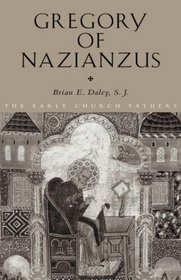St Gregory of Nazianzen, also known as 'the Theologian', was one of the key architects of the Early Christian Church, along with St Basil and St Gregory of Nyssa. He was also one of the main theologians who was instrumental in formulating the doctrine of the Trinity, which today is held around the world by all the main denominations.
Gregory, like the other Gregory and Basil, recieved a first class education and came from a family with impeccable credentials. Originally trained as a Rhetorician (the ancient equivalent of a Lawyer or Orator) he originally aimed at a public life and career, but under Basil's guidance became a Bishop. While not brilliant at his administrative duties, Gregory's brilliant orations on various matters would later become key sources of theological reflection on many matters.
While not as an outstanding administrator as Basil, or as brilliant a philosophical theologian as St Gregory of Nyssa, Nazianzen still had a brilliant theological intellect. Key to him, as was to the other Cappadocians, is the incomprehensibility and inscrutability of God by virtue of his infinity, which is an essential property of his essence. This was used to defend against the heresy of Arianism and Eunomius, who believed that Jesus was not God but only a creature made by God, though the greatest creature in creation. Gregory's orations also though come down from the pinnacles of speculative theology and also concern many pastoral matters as well as orations for great figures in the Church, alive and dead. Gregory also sometimes describes his experiential awareness of the Trinity in personal experience and in the liturgy, which often form some of his most interesting works.
This work introduces some of his main works, including the theological orations and other works.
Gregory, like the other Gregory and Basil, recieved a first class education and came from a family with impeccable credentials. Originally trained as a Rhetorician (the ancient equivalent of a Lawyer or Orator) he originally aimed at a public life and career, but under Basil's guidance became a Bishop. While not brilliant at his administrative duties, Gregory's brilliant orations on various matters would later become key sources of theological reflection on many matters.
While not as an outstanding administrator as Basil, or as brilliant a philosophical theologian as St Gregory of Nyssa, Nazianzen still had a brilliant theological intellect. Key to him, as was to the other Cappadocians, is the incomprehensibility and inscrutability of God by virtue of his infinity, which is an essential property of his essence. This was used to defend against the heresy of Arianism and Eunomius, who believed that Jesus was not God but only a creature made by God, though the greatest creature in creation. Gregory's orations also though come down from the pinnacles of speculative theology and also concern many pastoral matters as well as orations for great figures in the Church, alive and dead. Gregory also sometimes describes his experiential awareness of the Trinity in personal experience and in the liturgy, which often form some of his most interesting works.
This work introduces some of his main works, including the theological orations and other works.




